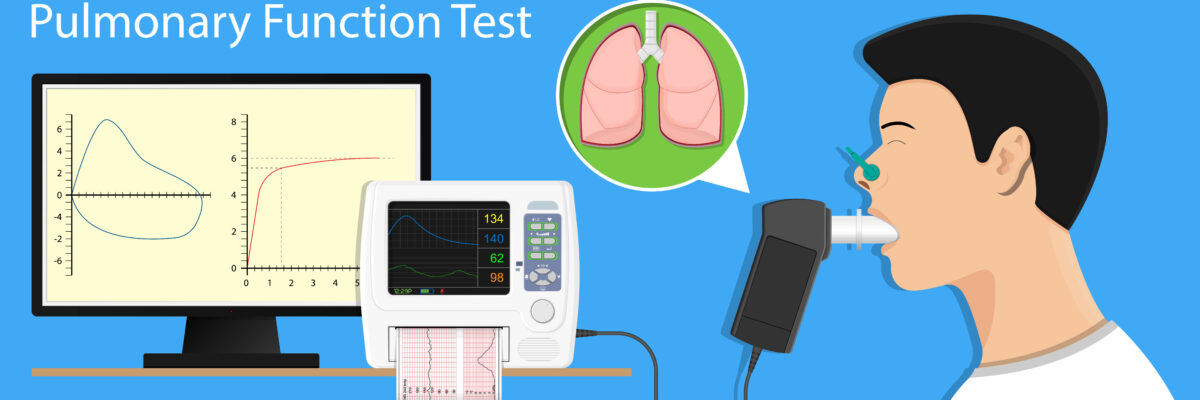PFT-Pulmonary Function Tests
What are pulmonary function tests?
Pulmonary function tests (PFTs) are noninvasive tests that show how well the lungs are working. The tests measure lung volume, capacity, rates of flow, and gas exchange. This information can help your healthcare provider diagnose and decide the treatment of certain lung disorders.
PFT can be done with 2 methods. These 2 methods may be used together and perform different tests, depending on the information that your healthcare provider is looking for:
Spirometry
A spirometer is a device with a mouthpiece hooked up to a small electronic machine.
Plethysmography
You sit or stand inside an air-tight box that looks like a short, square telephone booth to do the tests.
Why might I need pulmonary function tests?
There are many different reasons why pulmonary function tests (PFTs) may be done. They are sometimes done in healthy people as part of a routine physical. They are also routinely done in certain types of work environments to ensure employee health (such as graphite factories and coal mines). Or you may have PFTs if your healthcare provider needs help to diagnose you with a health problem such as:
- Allergies
- Respiratory infections
- Trouble breathing from injury to the chest or a recent surgery
- Chronic lung conditions, such as asthma, bronchiectasis, emphysema, or chronic bronchitis
- Asbestosis, a lung disease caused by inhaling asbestos fibers
- Restrictive airway problems from scoliosis, tumors, or inflammation or scarring of the lungs
- Sarcoidosis, a disease that causes lumps of inflammatory cells around organs, such as the liver, lungs, and spleen
- Scleroderma, a disease that causes thickening and hardening of connective tissue
PFTs may be used to check lung function before surgery or other procedures in patients who have lung or heart problems, who are smokers, or who have other health conditions. Another use of PFTs is to assess treatment for asthma, emphysema, and other chronic lung problems. Your healthcare provider may also have other reasons to advise PFTs.
What happens during pulmonary function tests?
You may have your procedure as an outpatient. This means you go home the same day. Or it may be done as part of a longer stay in the hospital. The way the procedure is done may vary. It depends on your condition and your healthcare provider’s methods. In most cases, the procedure will follow this process:
You’ll be asked to loosen tight clothing, jewelry, or other things that may cause a problem with the procedure.
If you wear dentures, you will need to wear them during the procedure.
You’ll need to empty your bladder before the procedure.
You’ll sit in a chair. A soft clip will be put on your nose. This is so all of your breathing is done through your mouth, not your nose.
You’ll be given a sterile mouthpiece that is attached to a spirometer.
You’ll form a tight seal over the mouthpiece with your mouth. You’ll be instructed to inhale and exhale in different ways.
You will be watched carefully during the procedure for dizziness, trouble breathing, or other problems.
You may be given a bronchodilator after certain tests. The tests will then be repeated several minutes later, after the bronchodilator has taken effect.

FAQs
What are the facilities available at the clinic?
The following facilities are available:
- Pulmonary function testing (Spirometry)
- Bronchoscopy
- EBUS
- Sleep studies (polysomnography)
- Thoracoscopy
- Lung cancer chemotherapy
I snore. Do I need to undergo a sleep study test?
It is not necessary that all persons who snore need to undergo a sleep study. There should be associated features to label it a disease. You should seek consultation from a sleep specialist in this case, who will screen you appropriately.
What will happen to my body if I sleep less?
Sleep is one of the key factors that determine the health of an individual. How one wakes up in the morning is a fair indicator whether one is getting a proper sleep or not. Therefore, if you have been snoozing your alarm too often, you might be damaging your own health. Experts believe that under normal circumstances, one should be able to wake up refreshed. And if you are not then you might be suffering from a sleep disorder. This can cause neurological changes in your body and can reduce the productivity at work. Moreover, in the short run it can cause memory problems and severe hormonal changes in your body.
Whatv is Pulmonary sleep test?
PFT measures how much air you can breathe in and out and how fast you can do it and how well your lungs are working to deliver oxygen to your blood. PFT is a painless test and a technician will ask you to take a deep breath and then blow as hard as you can into a tube connected to PFT machine.
PFT is the most important test for the diagnosis and management of COPD. PFT is similar to ECG of the lungs